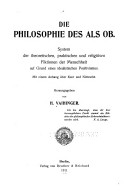The Philosophy of 'As if'

The German edition
|
|
| Author | Hans Vaihinger |
|---|---|
| Original title | Die Philosophie des Als Ob |
| Country | Germany |
| Language | German |
| Subject | Epistemology, Immanuel Kant |
| Published |
|
| Media type | Print (Hardcover and Paperback) |
| Pages | 368 (1968 Routledge edition) |
| ISBN | |
The Philosophy of 'As if': A System of the Theoretical, Practical and Religious Fictions of Mankind (German: Die Philosophie des Als Ob) is a 1911 book by the German philosopher Hans Vaihinger, based on his dissertation of 1877. The work for which Vaihinger is best known, it was published in an English translation by C. K. Ogden in 1924. In 1935, a revised and abbreviated English translation by Ogden was published. The revised translation was based on the sixth German edition of the original work.
Vaihinger, based on his study of Immanuel Kant and Friedrich Nietzsche, argues that while sensations and feelings are real, the rest of human knowledge consists of "fictions" that can only be justified pragmatically. In his view, even the laws of logic are fictions, albeit fictions that have proved their indispensable worth in experience and are thus held to be undeniably true. Vaihinger believes that it is not worth asking whether religious and metaphysical doctrines are true in an objective sense, since this cannot be discovered, but that one should ask whether it is useful to act 'as if' they were true. He concedes that the concepts of fiction and 'as if' vary depending on the type of truth concerned, which may be logical, scientific, religious, or something else.
The Philosophy of 'As if' influenced both Sigmund Freud and Alfred Adler. Though it contained the first use of the term "logical positivism", the logical positivists were generally dismissive of the work. The philosopher Moritz Schlick wrote that Vaihinger's description of his philosophy as a form of "idealist positivism" was one of its many contradictions.
The American journalist H. L. Mencken was scathing in his criticism of the book, which he dismissed as an unimportant "foot-note to all existing systems". Michael J. Inwood writes that Vaihinger's theory "involves familiar, though not necessarily insurmountable, difficulties". He finds it open to criticism on the grounds that it involves a covert appeal to a non-pragmatic concept of truth. He also notes that the theory implies that claims about the utility of holding doctrines and even the theory itself are no more than useful fictions.
...
Wikipedia
